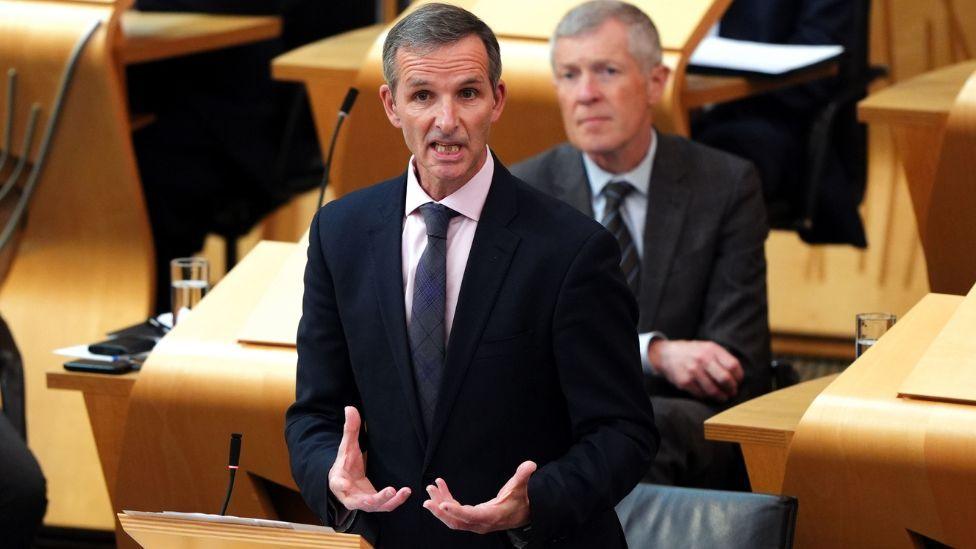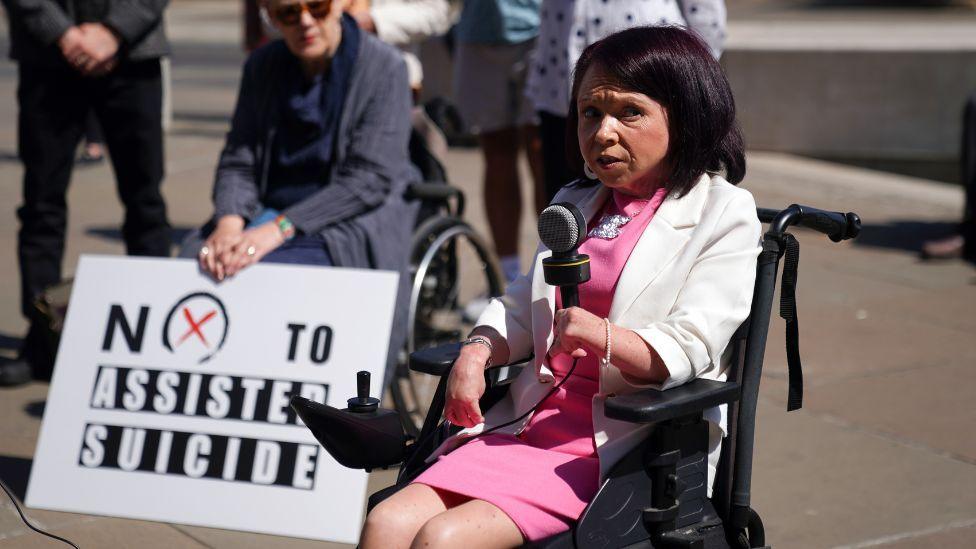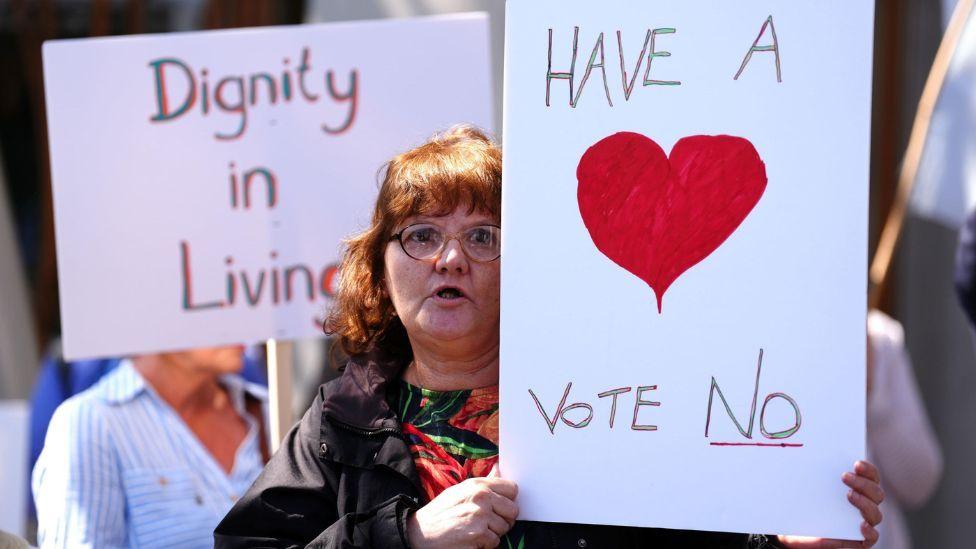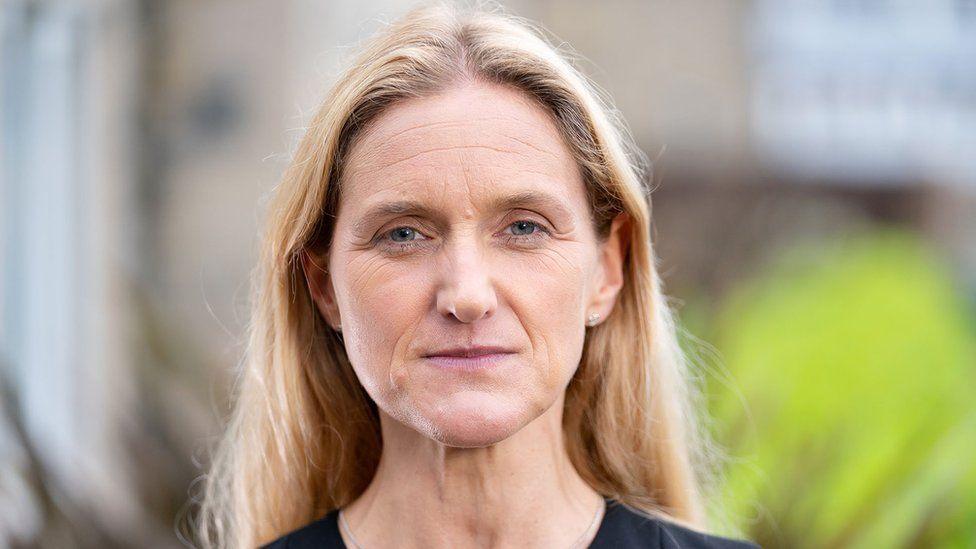Scottish assisted dying bill passes first vote
A bill to legalise assisted dying in Scotland has passed an initial vote
- Published
A bill to legalise assisted dying in Scotland has passed an initial vote at Holyrood.
The proposals would allow terminally-ill, mentally competent adults to seek medical help to end their lives.
A vote on the bill's general principles passed by 70 votes to 56.
It would need to clear two more phases of parliamentary scrutiny before it could become law.
The Assisted Dying for Terminally Ill Adults (Scotland) Bill, external would allow people to request medical assistance to end their own life – but only if they had a terminal illness and had been ruled mentally fit to make the decision by two doctors.
During a highly emotional but measured debate, MSPs cited powerful testimony from family members and constituents.
Supporters described the bill as a progressive move to ease the suffering of dying Scots.
However opponents raised concerns about safeguards for some of the most vulnerable people in society.
Brought forward by Liberal Democrat MSP Liam McArthur, the bill was the third proposed assisted dying law to be voted on at Holyrood since 2010. The two previous bills failed to pass stage one.
McArthur told BBC Scotland News he was "delighted" and "relieved" but said there was still more work to be done.
It comes after a bill to legalise assisted dying in England and Wales passed a stage one vote at Westminster in November.

Liam McArthur tabled the Assisted Dying for Terminally Ill Adults (Scotland) Bill
Opening the debate, an emotional McArthur told MSPs: "Today we can take a significant step forward giving terminally ill adults across Scotland more choice.
"It's a brave step, yes, but it's a compassionate one.
"And it is a step I believe Scotland is ready to take."
The proposals were supported by Conservative leader Russell Findlay and Lib Dem leader Alex Cole-Hamilton, as well as Scottish Green co-leaders Patrick Harvie and Lorna Slater.
Another supporter, SNP MSP Elena Whitham, told parliament about her mother, Irene, who died aged 58 just five weeks after being diagnosed with terminal cancer in 2014.
"Her last decision on this earth was to starve herself to hasten her inevitable death," Whitham said. "It was awful."
She added: "My mum deserved to plan a compassionate death.
"No-one should be forced to starve themselves."
'Dignity, courtesy and respect'
The parliament held a free ballot on the bill – meaning MSPs were not told how to vote by their parties or the government.
The Scottish government is officially neutral on the matter. Health Secretary Neil Gray, who spoke on behalf of the government during the debate, abstained from the vote.
Voicing their personal opinions, First Minister John Swinney and Deputy First Minister Kate Forbes have spoken out against the bill, as has Scottish Labour leader Anas Sarwar.
Following the vote, Swinney said the bill had been debated with "dignity, courtesy and respect".
He added that "significant issues" about the proposals would be raised at the next stage of parliamentary scrutiny.

Labour MSP Pam Duncan-Glancy warned about the impact of the bill on disabled people
Labour MSP Pam Duncan-Glancy, the first permanent wheelchair user to be elected to Holyrood, has been among the most vocal critics of the bill.
She told BBC Scotland News she was "heartbroken" by the vote.
During the debate, Duncan-Glancy told parliament she was "deeply worried" about the consequences of legalising assisted dying, which she said could put disabled people at risk.
The Glasgow MSP said she feared it could become "easier to access help to die than help to live".
She warned the bill could "legitimise a view that a life like ours, one of dependence and often pain, is not worth living".
Others opposed to assisted dying, including former first minster Nicola Sturgeon, have raised concerns about the potential for "coercion" and warned the definition of a terminal illness was too broad.
Ex-Tory leader Douglas Ross echoed concerns that the legislation would lead to a so-called slippery slope, fearing that access to assisted dying would widen over time.

Campaigners demonstrated outside the Scottish Parliament ahead of the vote
McArthur insisted the bill would impose "strict eligibility criteria" and that fears of a "slippery slope" had been raised in countries where assisted dying had since been successfully introduced.
Responding to concerns about disabled people, he said: "Denying dying Scots more choice will not enhance the lives of those with a disability.
"Nor do I believe would it be acceptable for a person with a disability who meets the eligibility criteria under my bill to be denied the same choice as anyone else."
In the assisted dying bill making its way through Westminster, a terminally ill person is defined as someone who has less than six months to live.
The Scottish bill, meanwhile, does not have a life expectancy timescale. It instead refers to an advanced and progressive disease that is expected to cause premature death.
McArthur acknowledged concerns about the definition, but said he does not believe it should include life expectancy, citing advice from medical experts.
MSPs will be able to further scrutinise the bill at stage two, where they can also propose changes.
Another vote on the final draft of the bill would need to be held before it could become legislation.
Humanist Society chief executive Fraser Sutherland welcomed "a major step forward towards choice and compassion at the end of life in Scotland".
Ally Thomson, director of Dignity in Dying Scotland, called the vote a "watershed moment for compassion".
But Dr Gordon Macdonald, chief executive of Care Not Killing, said there remained "massive opposition" to the bill.
Stuart Weir, head of Christian charity CARE for Scotland, said the organisation was "deeply saddened" by the news, adding: "Our thoughts are with disabled Scots and many others who will be feeling great anxiety."
The most recent Holyrood vote on assisted dying, in 2015, was defeated at stage one by 82 votes to 36.
That bill was tabled by the late independent MSP Margo MacDonald, who died in 2014 after being diagnosed with Parkinson's disease.

It was a passionate and respectful debate with deeply personal experiences informing the arguments for and against.
Holyrood has rejected assisted dying on two previous occasions, most recently in 2015, but at this third time of asking MSPs have given their approval in principle.
Those promoting the legislation were pleasantly surprised to discover that support for the bill was even stronger than they had anticipated.
It is worth noting that a number of those who backed the bill still have deep reservations and want to see that their concerns can be addressed in the next stage of debate.
There are likely to be significant changes to Liam McArthur's current proposals before a final vote in the coming months.
This is not the last word on this issue and campaigners on both sides still have much work to do to shape opinion on whether terminally ill patients should be able to seek medical help to end their lives.
Get in touch
Are you following the progress of the assisted dying bill?
Related topics
- Published20 June
